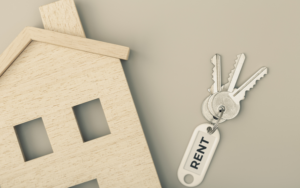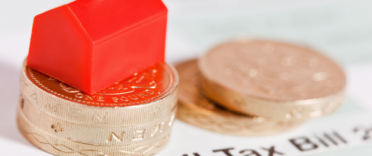The cost of living crisis is affecting households across the UK with renters left in a particularly vulnerable position. Average rent prices went up by 9% in the 12 months to December 2024 according to the latest data from the ONS. Rent prices increased the most in London where they went up by 11.5%. In England, the average monthly rent is now £1,369 while people in Wales and Scotland pay £777 and £991 on rent respectively.
Your rent payment is one of the most important and likely one of the most expensive bills to pay. If you find that you are feeling overwhelmed with the cost of living and are struggling to afford your bills each month, read our cost of living payment guide to see if there is any additional help you could be benefitting from. We also share some money-saving tips in our article, 'How to save money on your household bills'.
In this article, we look at what to do if you're struggling to afford your rent, what help you may be able to get to pay your rent and what to do if you need debt help and advice.
What to do if you’re struggling to pay your rent
If you are struggling to make ends meet each month there is help available that can ease the financial burden. If you are struggling with debt and unsure where to turn, there are a number of places where you can seek free debt advice. If you are homeless or think you will be homeless in a few weeks, contact your council for help and support. You can find out your local council's details on the government website.
Below we share what to do if you're struggling to afford your rent.
Create a budget
If you are struggling to make ends meet each month and find you are struggling to pay your rent you should take a look at your monthly budget to see if there are areas of your finances which can help you to save money. We have a handy budget planner spreadsheet which helps you to identify all areas of your finances and where your money is going each month. Looking at your budget can help identify areas where you may be overspending, which could help you cut costs.
The easiest way to create a budget is to list all of your income and outgoings each month. Watch this video on how to use our budget planner to get started.
Alternatively, you may prefer to use a budgeting app which connects to your bank and does a lot of the hard work for you. Find out more in our article, 'The best budgeting apps in the UK'.
Are you eligible for benefits?
If you have looked at your monthly budget and not found much room for cutting back you should also check to see if you are getting all of the help you are entitled to. You may be able to get additional support to pay your rent if you are unemployed, on a low income or receive certain benefits. You can use one of the following benefit calculators to see if you are entitled to any help, how much help you can get and how the benefits may be affected if your work hours change or you have a child:
In order to find out your benefits eligibility you will need to provide information about your savings, your income (including your partner if you have one), details about any existing benefits you receive, your outgoings and your council tax bill. If you are under the age of 18, not a British or Irish citizen, a student, a prisoner, living outside of the UK or a permanent resident of a nursing or care home you will not be able to use the calculators for accurate results.
Do you already receive benefits?
If you already receive benefits such as housing benefits or Universal Credit, you might be able to ask the DWP to use your benefits to pay your landlord directly in some circumstances. This can work particularly well if you're already in arrears and are trying to negotiate a repayment plan with your landlord.
However, if your benefits aren't enough to cover what you owe, you might be able to ask for additional one-off benefits such as a discretionary housing payment (DHP). This benefit is provided by your local council and is designed to help you pay your rent. You will typically only be eligible if you receive Housing Benefit or Universal Credit and if these benefits are less than your rent.
This is a discretionary payment which your council may choose to give you depending on your circumstances. You can get help filling out a claim form for a DHP through Citizens Advice or you can contact your local council directly to get more information.
What help is available for those not eligible for benefits?
If you do not currently receive benefits or help towards paying your rent and are not eligible to receive a benefit to help manage the cost, you may be able to seek help in other areas of your finances. For example, you can contact your energy supplier to find out what help is available to you. Our article 'How to save money on household bills' also offers additional tips on how you can save money in other areas of your finances. Alternatively, contact your local Citizens Advice for help and guidance.
Check if your landlord is allowed to increase your rent
If you're in a situation where you were able to afford your rent until your landlord increased it, then your first step should be to check if your landlord is allowed to increase your rent in the first place.
If you have a private landlord and you started renting after January 15, 1989, then there are rules in place for any rent increases to be valid.
For example, if you have an assured shorthold tenancy agreement, then your landlord can increase your rent in line with the rent prices in the area. So, if rents in your local area have gone up, then your landlord can increase your rent to match the rent paid for similar properties. However, this typically can't happen mid-contract unless there's a specific clause in your tenancy agreement that allows it.
In addition to this, your landlord has to give you notice which varies depending on your contract. For example, if you have a 1-year tenancy contract, then your landlord has to give you at least six months' notice.
If you don't believe your landlord is allowed to increase your rent, then you can challenge the rent increase via a rent tribunal. The Citizens Advice website has plenty of information on how to do this, and if you get in touch with them, they can help you through the process.
However, if your landlord has increased your rent in line with the appropriate process, then you may need to negotiate with them directly to reach an agreement.
Contact your landlord
If you are struggling to afford your rent you should contact your landlord as soon as possible to try and agree on an affordable repayment plan. If you know you are struggling to afford your next payment before it is due it is advisable to contact your landlord to let them know rather than missing the payment altogether. If you are able to afford some of your rent it may also be a good idea to pay what you can as this can help you at a later date prove you are trying to pay what you can afford.
If you have missed your rent payment altogether you are now in rent arrears and you could be at risk of eviction. Contact your landlord to see if you can agree on a repayment plan. This could mean that you agree to pay a regular amount weekly or monthly towards any money owed to your landlord. If you are in rent arrears, have received court papers or you are unable to reach an agreement with your landlord, contact your local Citizens Advice as soon as possible. Additional information on housing and rent advice can be found on the Shelter website.
Know your rights when it comes to eviction because if your landlord has served an eviction notice, you may not have to leave your property immediately as there are strict rules on notice periods. Find out more on the Citizens Advice website or by visiting Shelter.
Where to get free debt help and advice
If you are overwhelmed with worry about your financial circumstances seek help as soon as possible. For example, if you are struggling with debt, you may be able to apply for Breathing Space also known as the Debt Respite Scheme. With this scheme, you can get temporary protection from your creditors for up to 60 days if you're based in England and Wales. During this time, you are expected to get debt advice and figure out how to manage your debt.
However, during this time your creditors won't be able to take enforcement action against you, add interest to your existing debt, or contact you about your debt at all. This can include your landlord if you're in rent arrears, for example. You can find out if you're eligible and how to apply for the Breathing Space scheme via the government website.
There are also a number of charities and websites that offer free debt help and advice, some of which we list below. For more information read our article, 'Where to get free debt advice'.
Where to get free debt help and advice:
- Citizens Advice
- MoneyHelper (formerly the Money Advice Service)
- National Debtline
- Payplan
- StepChange
- The money charity
- Turn2us






